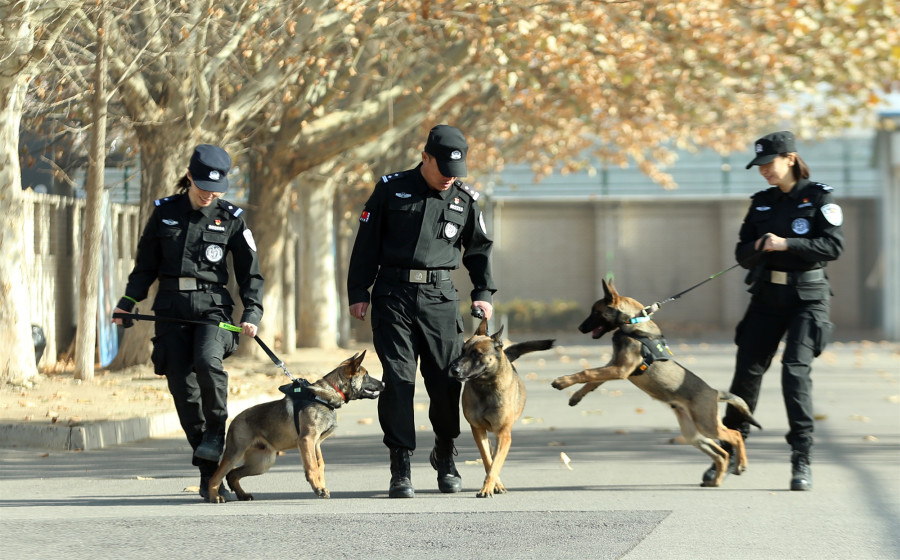When you have a top-performing police dog, what do you do next? You clone it, of course.

Two young cloned dogs and their genetic parent (center) receive training at the police dog center of the Beijing Public Security Bureau last month. (Photo: China Daily)
After seeing the success of six cloned police dogs last year, law enforcement authorities in Beijing said they will continue to work with enterprises to create more. Among other things, they'll create a canine DNA bank to fully preserve the characteristics of the best animals.
Early last year, the police dog center of the Beijing Public Security Bureau unrolled its plan to clone and train police dogs in cooperation with Sinogene, a leading pet cloning company in China.
Based on skin samples from two dogs, both Belgian Malinois, six cloned dogs entered the world in August.
"The two gene donors — one 4 years old and the other 5 — are excellent police dogs with outstanding explosiveness and sense of smell," said Ma Jinlei, a police officer engaged in the cloning and training work.
He said the donor dogs have contributed to the capital's law enforcement efforts by helping to solve criminal cases.
Cloning to pass down the genes of prominent police dogs has been a central task of the base in recent years, he said, "especially when high-class dogs get old".
The animals' excellent genes will help improve the quality and efficiency of breeding police dogs and also help to shorten their training period, he added.
At birth, the average weight of the six cloned dogs was 450 grams, with an average body length of 18 centimeters. Their DNA is virtually identical to the donor dogs — more than 99 percent. Four of the animals came from the same litter.
With the dogs' birth, the bureau rose to the No 1 spot nationally for most cloned police dogs.
"The six dogs began their training soon after they were born, and they responded more quickly than other police dogs," said Liu Fengyi, a police officer responsible of the training.
Accompanying the cloned dogs and observing their growth, Liu provided training in sense of smell, hearing and touch to help them adapt to their environment.
"I played music to them, touched them and shared their living space, as such moves can help them grow stronger more rapidly," he said. Such techniques also help test a dog's natural abilities at an early stage.
After about three months of training, the cloned dogs are capable of responding quickly to orders from their trainers and can obey commands to bite, catch and pick up objects, Liu said.
"Other police dogs typically require at least six months of training to get to that level," he said.
On Nov 20, the six cloned canines became official recruits of the Beijing police after passing the center's exams. In a ceremony, trainers put badges, colored collars and uniforms on the cloned dogs, marking their official entry into the force.
The new members — named Ke Zhong, Ke Cheng, Ke Zhi, Ke Hui, Ke Chuang and Ke Xin — "have been our teammates ever since, playing and training with us", Liu said.
When a reporter visited the center in December, the six 4-month-old clones had grown bigger and stronger. Their average weight was more than 15 kg and their bodies had grown to 52 cm. Though they have a similar appearance, they show their own characteristics and offer different advantages.
"Ke Cheng is a very active and easygoing dog. Compared with the other five, my dog is better at biting and picking things up," said Liu Shasha, 38, a female trainer at the center, who said such strong points will help police officers follow and detain suspects.
She regards Ke Cheng as her friend, noting that training a police dog is like looking after a baby that needs patience and care.
"When I find Ke Cheng not energetic as usual, I'll take him to the center's veterinarians to receive medical treatment," she said. "I have to make sure he is trained in top condition."
She said she trains Ke Cheng four or five times a day and also promotes the personal relationship by running with him. "If we can get along with each other, I believe we will be able to solve criminal cases better," she said.
The six dogs are still in the early stages of training. They'll be trained and monitored closely for six or seven months, at which time they'll get new tests to evaluate what specific role each is best suited to play in police work. of the six cloned dogs.
"When they grow six or seven months, we'll give them new tests to evaluate what roles they will play," Liu Shasha added. "At that time, we'll know which clone will be a suspect catcher and which will help anti-drug agencies by smelling."
Established in 1954, the center has more than 300 police dogs. There are around 10 breeds, including German shepherds, Dobermans and Labradors. Most of them are trained to assist police officers in solving criminal cases and assisting in security checks for explosives.
China's first cloned police dog, Kunxun, was born in Yunnan province in December 2018. The animal was cloned from a 7-year-old female Kunming wolfdog named Huahuangma, which serves at Pu'er police station in Yunnan. It has taken part in cracking dozens of murder cases and is considered a great detective.
After completing the training program at the Kunming police dog center, Kunxun passed the tests and is now ready for work.


